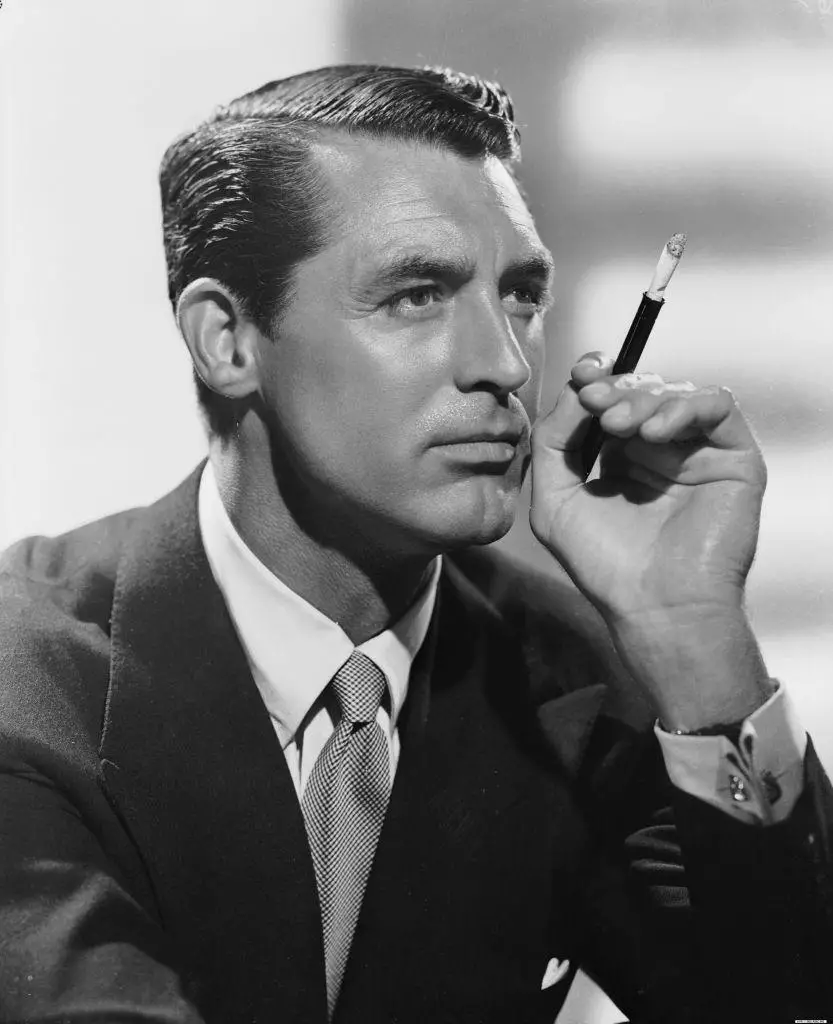Cary Grant (1904–1986) was an iconic English-American actor known for his suave charm, impeccable comedic timing, and versatility in a wide range of film genres. Born as Archibald Leach in Bristol, England, Grant transitioned from a difficult childhood to become one of Hollywood’s leading actors during the Golden Age. His filmography includes classics like “North by Northwest,” “Bringing Up Baby,” and “To Catch a Thief.” Grant’s charismatic screen presence and timeless appeal earned him acclaim as one of the greatest actors in the history of cinema.
Grant’s early life was marked by challenges. His parents, Elias James Leach and Elsie Maria Kingdon, went through a tumultuous marriage, eventually separating when Grant was just nine years old. The impact of his parents’ troubled relationship left a lasting imprint on young Archie, who sought refuge in the world of entertainment.
At the age of 13, Grant joined a troupe of acrobats called “The Penders,” touring the vaudeville circuit. This experience not only provided him with an escape from his troubled family life but also instilled in him a love for performing. Grant’s acrobatic skills and stage presence became the foundation for his future career in entertainment.
In the early 1920s, Grant decided to pursue acting more seriously. He traveled to the United States with the Pender troupe, and after their disbandment, he chose to stay in the U.S., setting the stage for his Hollywood career. Starting with small roles on Broadway and in silent films, Grant gradually worked his way up in the entertainment industry.
The pivotal moment in Grant’s career came when he signed a contract with Paramount Pictures in the early 1930s. The studio played a crucial role in shaping his image and screen persona. His early roles, often as a debonair and suave leading man, laid the groundwork for the Cary Grant that audiences would come to adore.
Grant’s breakthrough came with his role in “She Done Him Wrong” (1933), opposite Mae West. The film’s success catapulted him to stardom, and his charisma and screen presence began to captivate audiences. Grant’s journey in Hollywood was marked by collaborations with legendary directors such as Howard Hawks and George Cukor, establishing him as a versatile actor adept at both comedy and drama.
The 1930s and 1940s saw Grant starring in a string of successful films, including “The Awful Truth” (1937), “Bringing Up Baby” (1938), and “His Girl Friday” (1940). His ability to seamlessly transition between screwball comedies and more serious fare showcased his versatility. Grant’s on-screen partnership with actress Irene Dunne in films like “The Awful Truth” displayed their remarkable chemistry and comedic timing.
The 1940s marked a turning point in Grant’s personal life. His marriage to Virginia Cherrill ended in divorce, and he remarried actress Barbara Hutton, a union that was short-lived. Despite personal challenges, Grant’s career continued to flourish, and he became a sought-after leading man in Hollywood.
World War II had a significant impact on Grant’s life and career. In 1942, he became a U.S. citizen, a reflection of his deep connection to his adopted country. Grant also took a brief hiatus from acting to serve in the U.S. Army, where he worked on propaganda films. His commitment to the war effort earned him the respect of both the industry and the public.
Post-World War II, Grant returned to Hollywood, and his career reached new heights with films like “Notorious” (1946), directed by Alfred Hitchcock, and “The Bishop’s Wife” (1947). The latter showcased his ability to play more sensitive and charming characters, a departure from his earlier, more comedic roles.
The 1950s saw Grant further evolving as an actor. Films like “An Affair to Remember” (1957) and “North by Northwest” (1959) solidified his status as a leading man capable of delivering nuanced performances. His collaboration with Hitchcock in “North by Northwest” showcased his ability to embody the quintessential Hitchcockian protagonist – suave, sophisticated, and often caught up in a web of intrigue.
Grant’s personal life underwent significant changes in the 1950s. His marriage to actress Betsy Drake marked a period of stability, and the couple enjoyed a happy and supportive relationship. It was during this time that Grant became a father through adoption, a role he embraced with enthusiasm and dedication.
In 1962, Grant’s marriage to Betsy Drake ended in divorce, leading to his union with actress Dyan Cannon. The couple’s tumultuous relationship, marked by highs and lows, ultimately ended in divorce in 1968. Despite the personal challenges, Grant’s career continued to flourish, and his collaborations with directors like Stanley Donen in “Charade” (1963) showcased his enduring appeal.
Grant’s fifth and final marriage was to Barbara Harris, a union that lasted until his death. The birth of their daughter, Jennifer Grant, brought joy and fulfillment to his personal life. Grant embraced fatherhood with the same charm and warmth that defined his on-screen persona.
The 1960s and early 1970s saw Grant in a mix of comedic and dramatic roles, including films like “Father Goose” (1964), for which he received a Golden Globe Award, and “Walk, Don’t Run” (1966). Despite approaching his senior years, Grant’s charisma and screen presence showed no signs of diminishing.
In 1970, Cary Grant received an Honorary Oscar for his “unique mastery of the art of screen acting with the respect and affection of his colleagues.” The award recognized not only his contributions to film but also his enduring impact on the industry. Grant’s decision to retire from acting after receiving the Honorary Oscar marked the end of a remarkable career.
Grant’s post-retirement years were marked by a focus on personal happiness and contentment. He dedicated more time to his daughter, Jennifer, and enjoyed a quieter life away from the spotlight. Cary Grant’s death on November 29, 1986, marked the end of an era in Hollywood.
Cary Grant’s legacy endures as one of Hollywood’s true icons. His impact on the world of cinema, characterized by his suave charm, impeccable comedic timing, and versatility as an actor, remains unparalleled. Grant’s ability to transition seamlessly between genres, from screwball comedies to suspenseful thrillers, showcased his range and solidified his status as a cinematic legend.
Beyond his on-screen persona, Grant’s journey from a troubled childhood to international stardom serves as a testament to his resilience and determination. His personal challenges, including failed marriages and the quest for lasting happiness, added depth to his public image, making him a relatable and enduring figure in the hearts of fans worldwide.
Cary Grant’s name continues to evoke an image of sophistication, elegance, and timeless charm. His contribution to the world of entertainment transcends generations, and his films remain a source of joy and inspiration. Cary Grant, the epitome of the leading man, left an indelible mark on Hollywood, and his legacy lives on in the hearts of those who continue to enjoy his timeless performances.










